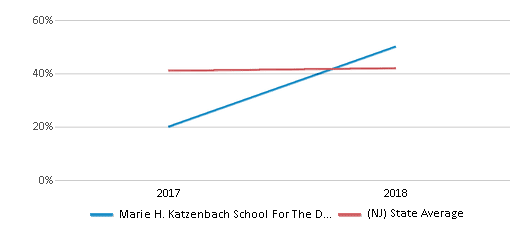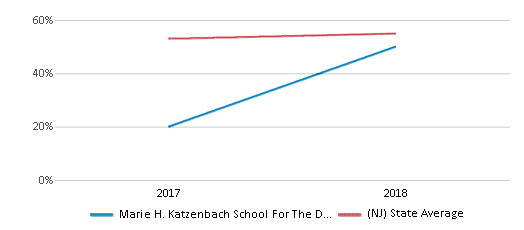For the 2025 school year, there is 1 public elementary school serving 36 students in Marie H. Katzenbach School For The Deaf School District.
Public Elementary Schools in Marie H. Katzenbach School For The Deaf School District have a diversity score of 0.60, which is less than the New Jersey public elementary school average of 0.72.
Minority enrollment is 83% of the student body (majority Hispanic), which is more than the New Jersey public elementary school average of 63% (majority Hispanic).
Overview
This School District
This State (NJ)
# Schools
2 Schools
1,930 Schools
# Students
71 Students
886,629 Students
# Teachers
n/a
77,858 Teachers
Student : Teacher Ratio
n/a
n/a
District Rank
Math Test Scores (% Proficient)
(17-18)<50%
42%

Reading/Language Arts Test Scores (% Proficient)
(17-18)<50%
55%

Students by Ethnicity:
Diversity Score
0.60
0.72
# American Indian Students
n/a
1,992 Students
% American Indian Students
n/a
n/a
# Asian Students
1 Student
92,318 Students
% Asian Students
2%
10%
# Hispanic Students
40 Students
301,752 Students
% Hispanic Students
56%
34%
# Black Students
14 Students
132,335 Students
% Black Students
20%
15%
# White Students
15 Students
325,482 Students
% White Students
21%
37%
# Hawaiian Students
n/a
1,690 Students
% Hawaiian Students
n/a
n/a
# Two or more races Students
1 Student
30,907 Students
% of Two or more races Students
1%
4%
Students by Grade:
# Students in PK Grade:
4
41,362
# Students in K Grade:
1
85,425
# Students in 1st Grade:
3
93,943
# Students in 2nd Grade:
2
96,713
# Students in 3rd Grade:
3
95,865
# Students in 4th Grade:
2
97,373
# Students in 5th Grade:
6
98,202
# Students in 6th Grade:
6
99,575
# Students in 7th Grade:
6
80,278
# Students in 8th Grade:
3
80,823
# Students in 9th Grade:
6
4,713
# Students in 10th Grade:
5
4,047
# Students in 11th Grade:
10
3,770
# Students in 12th Grade:
14
4,350
# Ungraded Students:
-
190
Best Marie H. Katzenbach School For The Deaf School District Public Elementary Schools (2025)
School
(Math and Reading Proficiency)
(Math and Reading Proficiency)
Location
Grades
Students
Rank: n/an/a
Marie H Katzenbach Elementary Middle School For The Deaf
Special Education School
320 Sullivan Way
Trenton, NJ 08625
(609) 530-3120
Trenton, NJ 08625
(609) 530-3120
Grades: PK-8
| 36 students
Recent Articles

Year-Round Or Traditional Schedule?
Which is more appropriate for your child? A year-round attendance schedule or traditional schedule? We look at the pros and cons.

Why You Should Encourage Your Child to Join a Sports Team
Participating in team sports has a great many benefits for children, there is no doubt. In this article you will learn what those benefits are.

White Students are Now the Minority in U.S. Public Schools
Increasing birth rates among immigrant families from Asia and Central and South America, combined with lower birth rates among white families, means that for the first time in history, public school students in the United States are majority-minority. This shift in demographics poses difficulties for schools as they work to accommodate children of varying language abilities and socio-economic backgrounds.





